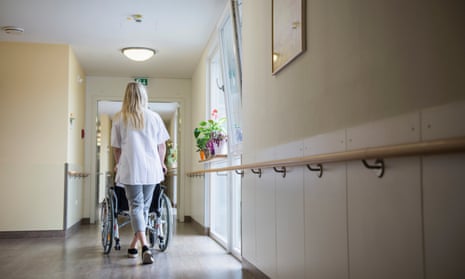The number of potential victims of modern slavery in the UK more than doubled to record levels last year, with a particularly sharp increase in alleged exploitation in the care sector, figures show.
Calls to the UK modern slavery helpline identified 6,516 potential victims last year, an increase of 116% from 2021, according to the figures from the anti-slavery charity Unseen. It said the potential victims included 173 children.
In its annual assessment of calls to the helpline, Unseen said the most notable trend in labour exploitation occurred in the care sector, amid concerns about labour shortages and low pay in care homes.
In the care sector, the number of potential victims increased from 106 in 2021 to 708 last year, the charity said. Exploitation of Indian, Zimbabwean and Nigerian nationals was particularly prominent in care homes, it said.
Its report said: “For the first time, these nationalities have been indicated in situations of forced labour related to a range of care settings.” Of the 46 Zimbabweans who were identified as potential victims of slavery in the UK last year, all but one were working in the care sector.
The report explained the context of exploitation concerns in the care sector. It said: “The care sector has always been an area where forced labour could be present because of the use of temporary labour and the levels of low pay.”
Unseen said that in order to protect victims, it could not provide details of the cases. But in one anonymised example highlighted in the report, it said one case involved several young men and women working in care homes on student visas through an agency.
At the time of the call to the helpline, they had been working 14-hour shifts for five days without pay. The agency was referred to HMRC for a failure to pay the minimum wage, and to the Gangmasters and Labour Abuse Authority, the report said.
The helpline also recorded 479 reports of sexual exploitation, an increase of 66% on the previous year. Instances of sexual exploitation made up 19% of all modern slavery cases.
Eleven cases of alleged labour exploitation reported last year referenced the Homes for Ukraine scheme. These involved 31 potential Ukrainian victims, the report said.
In one case, a Ukrainian had been offered £1,000 a month to cook, clean and shop, but received only £350, despite working for up to 15 hours a day and being subjected to verbal abuse.
In another, a Ukrainian family were made to share accommodation with animals as their UK hosts controlled their travel paperwork.
after newsletter promotion
The report also mentioned one case of potential organ harvesting involving two potential victims. This month, a senior Nigerian politician was jailed for almost 10 years for his part in an organ harvesting plot, after the first conviction of its kind under the Modern Slavery Act. The Metropolitan police said they were investigating more cases of organ trafficking to the UK.
Official statistics released this month showed that the number of potential victims of modern slavery was running at record levels from January to March this year. But there are concerns that the government’s illegal migration bill will make it harder to rescue modern slavery victims, because it proposes removing them from the UK before they can be conclusively identified as victims.
Justine Carter, a director at Unseen, said: “To be serious about tackling modern slavery in the UK, we need much more awareness of the true size of the problem, better support for victims, and get many more resources going into targeting the criminals behind the exploitation.
“Instead, the UK is bringing in new migration laws that criminalise some victims of modern slavery, forcing them underground and keeping them vulnerable to traffickers. We should be doing more to expose the extent of slavery, not driving it further into the shadows.”
